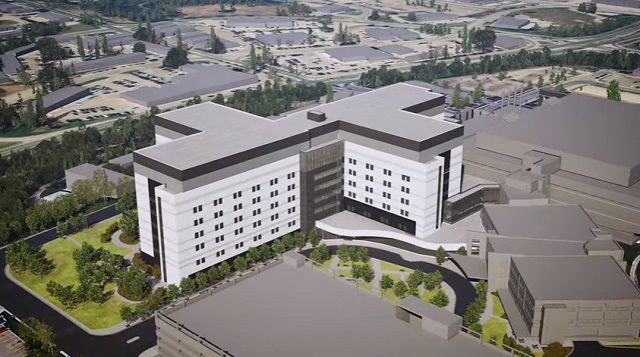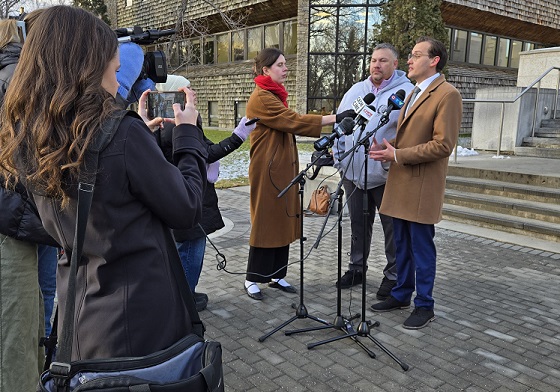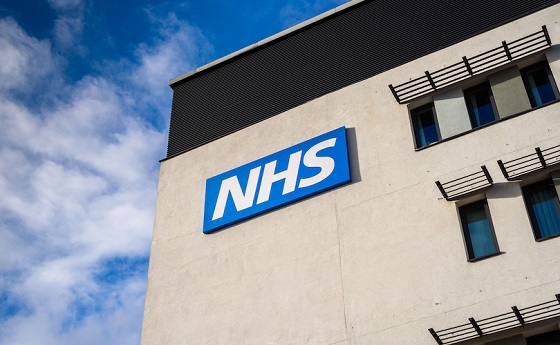Alberta
Red Deer Hospital preliminary designs unveiled

Alberta’s government shared preliminary designs of the Red Deer Regional Hospital Centre redevelopment with residents from central Alberta.
On March 14, Alberta’s government held its first public information session since January 2023 with Albertans in Red Deer and area about the Red Deer Regional Hospital Centre redevelopment. Albertans have long waited for the redevelopment and Alberta’s government made the first significant commitment and progress on the hospital by allocating $100 million in Budget 2020, followed by another $1.8-billion commitment in Budget 2022.
In addition to preliminary design drawings, residents were able to view a video simulating a flyover of the new patient tower and power plant. Project representatives were also on hand to speak about the project. The session was attended by about 150 residents, media and officials including Ken Johnston, mayor of Red Deer.
“We were excited to share preliminary designs for the Red Deer Hospital redevelopment yesterday. The number of people who attended the session validates the importance of this project to the central region. We are proud of the role Infrastructure is playing in delivering one of the most ambitious hospital redevelopment projects in Alberta’s history.”
“As the MLA for Red Deer-North and the Health Minister, I’m very proud of the progress we’ve achieved, and I remain dedicated to advocating for this project. Albertans should be able to access health care when and where they need it. This project will improve health outcomes for Albertans living in Red Deer and across central Alberta by increasing the facility’s capacity and providing much-needed services and resources, including new cardiac catheterization labs, close to home.”
Design work began in June 2023. With schematic design now complete, the hospital redevelopment is on schedule and on budget. The next stage of the project, design development, is now underway. Once complete, the new expansion will add up to 200 beds to the existing facility, bringing the total number of beds to up to 570.
“With an investment of $810 million over three years in the Budget 2024 Capital Plan, the expansion of the Red Deer Regional Hospital is Alberta’s biggest infrastructure project. Last night’s information session keeps Central Albertans informed about this exciting, transformative investment in our hospital, supporting principles of transparency and accountability in the use of taxpayer dollars.”
Quick facts
- There are two major components of this redevelopment:
- Project 1: construction of a new patient tower and expansion and renovation of the existing hospital’s main building
- Project 2: construction of an ambulatory building
- The project will upgrade several services throughout the hospital site including:
- an additional patient tower
- six new operating rooms
- new Medical Device Reprocessing department
- new cardiac catheterization labs
- renovations to various areas within the main building
- newly renovated and expanded emergency department, and
- a new ambulatory clinic building to be located adjacent to the surface parkade
Related information
Alberta
Red Deer’s Jason Stephan calls for citizen-led referendum on late-term abortion ban in Alberta

From LifeSiteNews
United Conservative Party MLA Jason Stephan told the legislature that most Albertans agree there should at least be limits on abortion.
Red Deer South UCP MLA Jason Stephan called on the public to rally to bring forth a referendum for a vote to ban late-term abortions.
Stephan spoke in the Alberta legislature on November 19 about late-term abortions, calling for a citizen-led referendum to ban the practice.
“Many Albertans do not want a society that is best at late-term abortions, and many of these Albertans feel that they are ignored on this matter sacred to them,” Stephan said.
“But Alberta has a Citizen Initiative Act, and most Albertans, regardless of faith or background, agree that it is reasonable to have some limits on late-term abortions. That is the case in most democratic jurisdictions.”
Stephan said that Canada is founded on “principles that recognize the supremacy of God.”
“Judeo-Christian principles recognize that men and women are children of God, each having a divine nature and destiny,” he said.
“They affirm the family as ordained of God and that children are a blessing. This is the opposite of Canada’s failure to do nothing about abortion, in particular late-term abortions.”
In Alberta, the Citizen Initiative Act allows the people, should they get 178,000 verified signatures, to call for a referendum, which Stephan said would allow “Albertans to judge for themselves” on the issue of late-term abortion.
“Seeing things as they really are will result in less abortion not by force of law but by the exercise of moral agency informed by truth,” he said
“It will be good for Albertans to have a referendum with honest conversations on late-term abortion, speaking the truth in love as each best understands it, with respect to all. Thank you.”
According to Prolife Alberta, Alberta’s United Conservative Party (UCP) government under Premier Danielle Smith “has the authority to rewrite AHS policy to require that infants born alive after a failed abortion receive the same degree of care as any other newborn child.”
The group is urging Albertans to sign up to support its “Left to Die” campaign and contact their local Members of the Legislative Assembly (MLAs) to “support” a “policy revision” of AHS guidelines, saying it “should be common-sense and bipartisan.”
Prolife Alberta has exposed the fact that late-term abortions happen in the province.
The ruling UCP party’s grassroots members will be debating restricting abortion funding at its upcoming AGM to be held November 28-30.
As reported by LifeSiteNews, People’s Party of Canada (PPC) leader Maxime Bernier has called late-term abortions “disgusting.”
Bernier recently called for an end to “infanticide” after another RightNow video exposed late-term abortions in Canada.
Smith has done well on some points but has been relatively soft on social issues of importance to conservatives such as abortion and has publicly expressed pro-LGBT views, telling Jordan Peterson earlier this year that conservatives must embrace homosexual “couples” as “nuclear families.”
Late-term abortions often result in live births, as the baby is not completely killed during the abortion procedure. As reported by LifeSiteNews recently, 150 babies were born after botched abortions in 2023-2024 in Canada, but it’s not known how many survived.
Similarly, reports from 2018 indicated that 766 babies were born alive after late-term abortions in Canada between 2013 and 2018 and presumably left to die.
There were 368,928 babies born in Canada from 2024 to 2025, a number that would be much greater if not for abortion. For context, in 2022, 97,211 Canadian babies were killed by abortion.
Alberta
Alberta introducing dual practice health care model to increase options and shorten wait times while promising protection for publicly funded services

Enhancing access through dual practice
If passed, Bill 11, the Health Statutes Amendment Act, 2025 (No. 2), would modernize physician participation rules to give doctors flexibility to work in both the public system and private settings. Dual practice would allow physicians to continue providing insured services through the provincial health insurance plan while also delivering private services.
Alberta’s government has looked to proven models in other jurisdictions to guide the development of a model that strengthens access while safeguarding the public system. Dual practice exists in New Brunswick and Quebec and is widely used in countries with top-performing health systems, including Denmark, the Netherlands, United Kingdom, France, Germany, Spain and Australia.
“For years, governments across Canada have tried to fix long wait times by spending more money, yet the problem keeps getting worse. Alberta will not accept the status quo. Dual practice gives us a practical, proven tool that lets surgeons do more without asking taxpayers to pay more. It means shorter waits, better outcomes and a stronger health system for everyone.”
If passed, this dual practice model would be closely monitored to protect Alberta’s public health care system. The government, for example, would ensure that dual practice physicians maintain separate records for the services they provide, so no public funding subsidizes private services.
Bill 11 would include provisions to restrict participation, which could include:
- Mandating that surgeons in dual practice must perform a dedicated number or ratio of surgeries in the public system to be eligible to perform surgeries privately.
- Restricting specialties to public practice if shortages would compromise public care.
- Potentially restricting private practice to evenings, weekends or to underutilized rural sites, as required.
Alberta’s government remains committed to its public health guarantee: No Albertan will ever have to pay out of pocket to see their family doctor or to get the medical treatment they need. These proposed changes comply with the Canada Health Act.
Alberta’s government is also committed to getting Alberta’s dual practice model right and to taking a thoughtful approach to ensure the best path forward. At this time, family medicine providers will not be eligible to be flexible participants within this new model. The priority is to focus on making sure all Albertans have access to a primary care provider. Additionally, surgeries for life-threatening conditions such as cancer and emergency procedures will remain entirely publicly funded with no private option available.
“Albertans are waiting too long for the health care they need, so we are taking bold and decisive action to shorten wait times, increase access and give Albertans more choices over their own health care. At the same time, we will continue building a strong public health system where no one is denied access to the services they need because of an inability to pay.”
If passed, Bill 11 would create new options for doctors and patients. It would expand Alberta’s health system to provide more care by allowing doctors to treat more patients. Each time a patient chooses to pay for care in a private clinic or a clinic operating on evenings and weekends, for example, resources would be freed up so another patient could receive publicly funded care. This proposed new model would also support physician attraction and retention.
“As dual practice enhances flexibility for Albertans, physicians and medical professionals, safeguards will be established and utilized to protect and grow hospital and public health system capacity.”
“Albertans deserve choice and timely access to safe care, whether in a private or public setting. With the creation of the dual practice model, we can extend treatment options to patients while helping hospitals focus their resources on the highest-acuity patients.”
“I believe all options to improve access to health care for Albertans should be on the table. Therefore, the government’s dual practice legislation is a welcome option. Appropriate guardrails must be in place to ensure the spirit of the Canada Health Act is maintained.”
Quick facts
- Physicians would continue to bill the provincial plan for public services and may offer private services separately.
- Physicians may still choose to work entirely in public or entirely in private settings.
Proposed legislation would modernize physician rules, drug coverage, food safety and health cards while improving oversight and administration in Alberta’s health system.
If passed, Bill 11, the Health Statutes Amendment Act, 2025 (No. 2), would amend several pieces of legislation to reflect Alberta’s evolving health needs, strengthen the ability of health care professionals to deliver care and improve accountability and efficiency across the system.
“This legislation represents a new era for health care in Alberta. By putting patients first and supporting providers, we are improving transparency, flexibility and access. With modernized physician rules, stronger drug coverage, enhanced food safety and better health information sharing, Albertans will have world-class care.”
Protecting drug coverage for Albertans
If passed, amendments would improve coordination between public and private drug plans, ensuring taxpayer-funded programs are used efficiently and remain available for those who need them most.
Private plans would become the first payer for individuals who have them, with public programs acting as a safety net. The legislation would also protect older Albertans by ensuring employers cannot reduce or terminate health benefits for employees aged 65 and older who remain actively employed.
“People shouldn’t be punished for getting older – it’s that straightforward. With this legislation, we’re protecting Albertans by ensuring employers can no longer kick folks off their health benefits when they need them most.”
Ensuring consistent billing and remuneration practices
Alberta’s government is also proposing amendments to the Alberta Health Care Insurance Act to ensure health care providers and clinics are not engaging in improper billing practices and making inappropriate claims. The proposed amendments would strengthen accountability and transparency while generating cost savings by introducing penalties for systemic non-compliance.
Strengthening food safety in Alberta
If passed, amendments to the Public Health Act and related regulations would strengthen food safety across all establishments by improving training for staff, increasing transparency of inspection results and giving inspectors new tools for oversight and investigation.
The changes would also update the Food Regulation, Food Retail and Food Services Code, Institutions Regulation and create a new Public Health Investigator Regulation, ensuring consistent standards, better reporting and increased public confidence in Alberta’s food safety system.
“Enhancing food safety in Alberta is an important step to making sure Albertans have the safeguards and protections in place to keep them healthy and well. If passed, these amendments to the Public Health Act will ensure food establishments are following best practices and that enforcement measures are in place to support proper food safety.”
Improving health cards and information sharing
If passed, the legislation would create a new process for health card renewal, prevent card misuse and allow cards to be seized or suspended if tampered with. The changes would also permit information sharing with the ministries of Technology and Innovation and Service Alberta and Red Tape Reduction to support continued efforts to modernize health cards.
Amendments to the Health Information Act would support a more integrated health care system and seamless patient experience to help improve care for Albertans who are accessing the system.
It would also add new authority to enable health foundations to better connect with patients to support innovation and advancement of care in their community in an appropriate manner, in accordance with the requirements set out in regulations.
“Albertans generously support enhancements to health care delivery, innovation and research in their communities each year. We look forward to working with our health partners across the continuum to better communicate with grateful patients. With these changes, we will join other Canadian jurisdictions in connecting patients with health foundations in their community while ensuring the strongest protection of Albertans’ private health data.”
Advancing a new era of health care
If passed, proposed amendments to the Alberta Health Care Insurance Act and the Provincial Health Agencies Act would support operational changes to implement previously announced objectives like transitioning Alberta Health Services to a hospital-based acute care service provider.
The proposed amendments would also result in the repealing of the Hospitals Act, as all hospital governance and operational provisions would be moved into the Provincial Health Agencies Act.
New dual practice model to increase access and choice
The Health Statutes Amendment Act, 2025 (No. 2) includes proposed amendments to the Alberta Health Care Insurance Act that would modernize how physicians participate in Alberta’s publicly funded health insurance plan. The changes would introduce a new dual practice model, giving physicians greater flexibility to provide care in both public and private settings while maintaining safeguards to ensure Albertans continue to have access to publicly funded health services.
-

 Alberta1 day ago
Alberta1 day agoPremier Smith explains how private clinics will be introduced in Alberta
-

 Alberta1 day ago
Alberta1 day agoAlberta introducing dual practice health care model to increase options and shorten wait times while promising protection for publicly funded services
-

 Business1 day ago
Business1 day agoUS Supreme Court may end ‘emergency’ tariffs, but that won’t stop the President
-

 Aristotle Foundation1 day ago
Aristotle Foundation1 day agoWe’re all “settlers”
-

 Indigenous20 hours ago
Indigenous20 hours agoIndigenous activist wins landmark court ruling for financial transparency
-

 Alberta21 hours ago
Alberta21 hours agoRed Deer’s Jason Stephan calls for citizen-led referendum on late-term abortion ban in Alberta
-

 espionage21 hours ago
espionage21 hours agoSoros family has been working with State Department for 50 years, WikiLeaks shows
-

 Health1 day ago
Health1 day agoMore than 200 children will receive dangerous puberty blockers for new UK study


